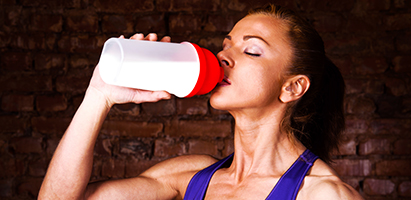
Make Protein Work for You - Powerful Protein Tips
Protein supplementation can have a powerful impact on your exercise goals. If you have been wondering why protein is such an important macronutrient, read on to find out how to make protein work for you.
Many athletes would be happy with more muscle. Exercise, especially resistance training, increases your muscle building and repair hormones allowing your body to use protein more effectively for muscle growth.1 A high protein diet may increase your muscle mass if used in conjunction with resistance training.2 When used in combination with a reduction in calories, higher protein intake may assist with body composition and lean body mass, in conjunction with appropriate exercise.3, 4 Additionally protein supplementation may support body composition by decreasing hunger and increasing your metabolism, fat burning5 and body heat.6, 7 Suffice to say, you may find substantial benefit in using protein to support your body composition goals.
So how can you use protein most effectively with your training? The most important times for athletes to take protein is an hour before exercise, or immediately afterwards to maximise muscle repair and recovery. It is recommended for athletes to include protein in every meal, as well as a snack in between meals to maintain high levels of dietary protein. Refer to the Endura Paleo-Performance Eating Plan for some great ideas on high protein meals.
Soy and whey protein are two concentrated and highly bioavailable forms of protein which can really boost dietary protein levels. Endura Pro Body Bars contain 18 g of combined whey and soy protein, making them an ideal pre- or post-exercise protein hit or between-meal protein snack. To increase your dietary protein levels and support muscle improvement goals, try the delicious Endura Pro Body Bars in Deluxe Fudge or Mint Slab and make protein work for you!

How Much Protein Do I Need?
Protein is an important nutrient for athletes, however everyone has a unique body type and different goals to achieve. With so much variation it may seem difficult to know what your individual protein requirements are. Table 1 provides a simplified guideline to help you calculate your protein requirements and can be applied across both body composition and muscle building goals. These guidelines have been adapted from information provided by the Australian Institute of Sport.
Table 1. Daily protein requirement guidelines for athletes8
| Moderate Intensity Endurance Athletes (Protein g/day) | Elite Endurance Athletes (Protein g/day) | |||
|---|---|---|---|---|
| Weight (kg) | Male | Female | Male | Female |
| 50-59 | 60-94 | 51-80 | 80-118 | 68-100 |
| 60-69 | 72-110 | 61-94 | 96-138 | 82-117 |
| 70-79 | 84-126 | 71-107 | 112-158 | 95-134 |
| 80-89 | 96-142 | 81-121 | 128-178 | 109-151 |
| 90-99 | 108-158 | 91-135 | 144-198 | 122-168 |
| 100-109 | 120-174 | 101-148 | 160-218 | 136-185 |
| 110-119 | 132-190 | 111-161 | 176-238 | 150-202 |
| 120-129 | 144-206 | 121-175 | 192-258 | 163-219 |
Remember, these protein guidelines provide daily totals to aim for and should be be divided between meals and snacks during the day (e.g. 90 g daily protein can be achieved by eating 20 g of protein at each main meal and two snacks of 15 g). By consuming your daily protein requirements, you will be able to support muscle growth and fat loss, shaping your body to maximise performance!
Powerful Protein Foods
If you are wondering which foods are highest in protein, look no further. Table 2 provides a useful guide as to which foods are highest in protein. So be sure to include these protein rich foods in your diet to maximise the impact of their crucial macronutrient.
Table 2. Protein rich foods.
| Protein Rich Food | Protein (g) Per 100 g Serve |
|---|---|
| Whey/Soy Protein Isolate | 90 |
| Beef | 36 |
| Beans (Soy) | 36 |
| Chicken | 30 |
| Seeds (Pumpkin) | 30 |
| Lamb | 28 |
| Pork | 28 |
| Fish | 26 |
| Legumes (Lentils) | 26 |
| Kangaroo | 24 |
| Nuts (Almond) | 22 |
| Cheese | 18 |
| Tofu | 17 |
| Eggs | 16 |
| Sprouts (Soy) | 15 |
| Yoghurt | 10 |
By incorporating these foods in your diet, you can be confident your protein requirements are being met - helping you achieve your body composition goals more efficiently.
Paleo Recipes for Performance

Quick Spanish Omelette
A quick omelette with a Spanish flavour.
1
Ingredients
- 3 eggs
- Cayenne or black pepper
- 1 handful of finely chopped vegetables e.g. olives, onions, chives, spinach, tomato, sweet potato
- Olive oil
Method
- Lightly stir-fry vegetables in extra virgin olive oil and remove to one side (sweet potato may require longer cooking time than other vegetables).
- Lightly mix eggs with one tablespoon of water and a pinch of pepper. Pour mixture into a heated fry pan. When almost cooked, top with stir fried vegetables and flip to heat through.

Portuguese Chilli Chicken
Portuguese Chilli Chicken
2
Ingredients
- ½ onion, chopped
- 2 small red chillies, deseeded and chopped
- 4 garlic cloves, chopped
- 2 bay leaves, ground
- ¼ teaspoon paprika
- Pinch of salt
- 2 teaspoons olive oil (for marinade)
- Juice of ½ lemon
- 2 palm size portions of chicken breast, chopped into large pieces
- 2 teaspoons olive oil (for frying)
- Your choice of fresh seasonal vegetables
Method
- Blend or crush all ingredients excluding chicken, vegetables and olive oil (for frying) in a mortar and pestle or food processor.
- Marinate chicken in this mixture for at least 30 minutes, or overnight if desired.
- Fry chicken in olive oil until browned and cooked through.
- Steam vegetables until lightly cooked and serve with chicken.
* References available on request.